How To Keep Eggs From Freezing In The Winter
If you live in a cold climate, then you may worry about the eggs from your backyard chickens freezing in the cold. Today I will share with you my top tips for how to Keep eggs from freezing in the winter.
Use them to help fill your kitchen with amazing farm-fresh eggs no matter how cold it gets. One of the benefits of raising chickens is the eggs, so do what you can to get the best.
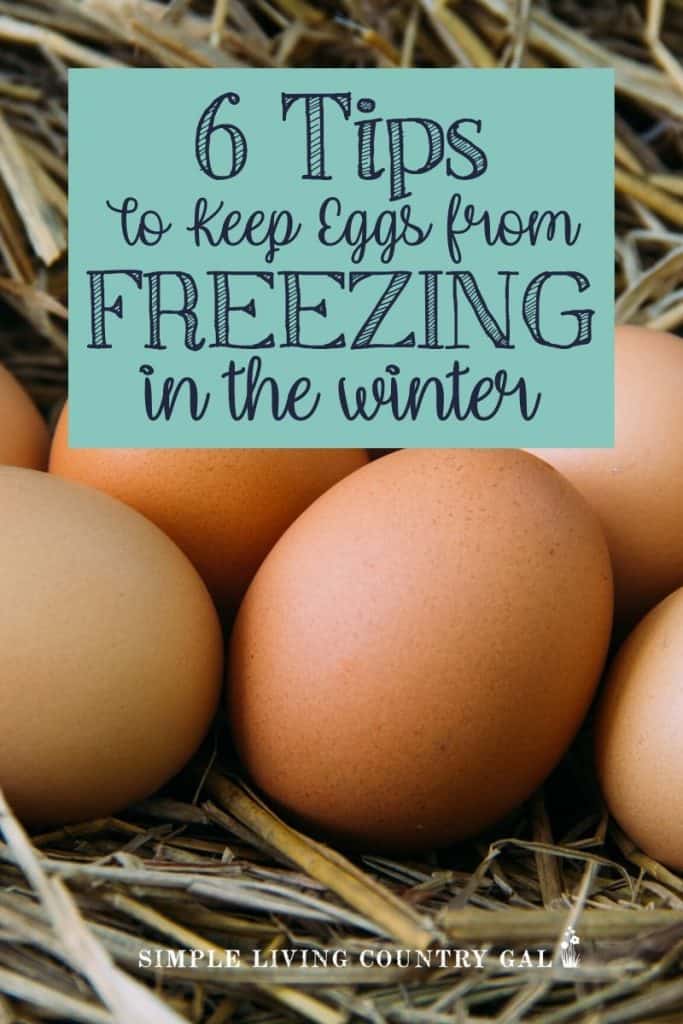
There is one question I get asked all the time by new chicken owners. Do chickens lay eggs in the winter? And the answer is, yes, they absolutely do.
It’s not the cold that slows down egg production so much for a hen, as it’s the amount of daylight. For that reason, many backyard chicken owners will use artificial light in the chicken coop to help their chickens lay more eggs throughout the winter months.
But, once you have the egg production up again you may then be faced with another problem. How do you keep eggs from freezing in the bitter cold of winter?
That is another issue entirely and one we are going to dive into today.
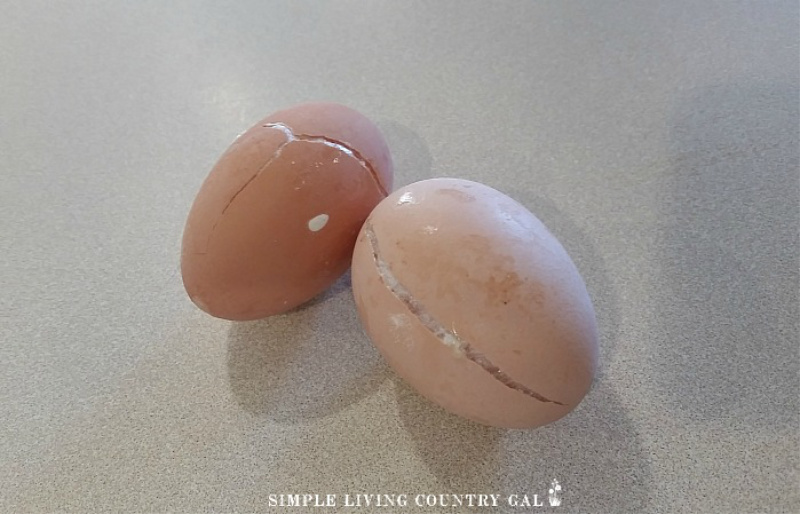
It happens to the best of us.
We need to go out to the coop and collect the eggs but it is just so darn cold and our home is so nice and toasty. So, instead, we delay trudging out into the snow, enjoying the warmth just a bit longer. Later, when we do head out into the chicken coop we are greeted with ice-cold, frozen, and even cracked eggs.
Frustrating, yes, but not the end of the world. Or the egg for that matter.
Before we talk about what you can do with frozen eggs from the chicken coop, let’s first talk about tips on how to keep those eggs from freezing in the first place.
Do chickens lay eggs in the winter?
It’s true that many hens stop or slow down egg production during the fall and winter. This due more to the amount of light during the day than the colder temperatures both inside and outside of the coop.
To help your chickens continue to lay consistently, you can put a light inside of the coop to give them more light encouraging them to lay each day.
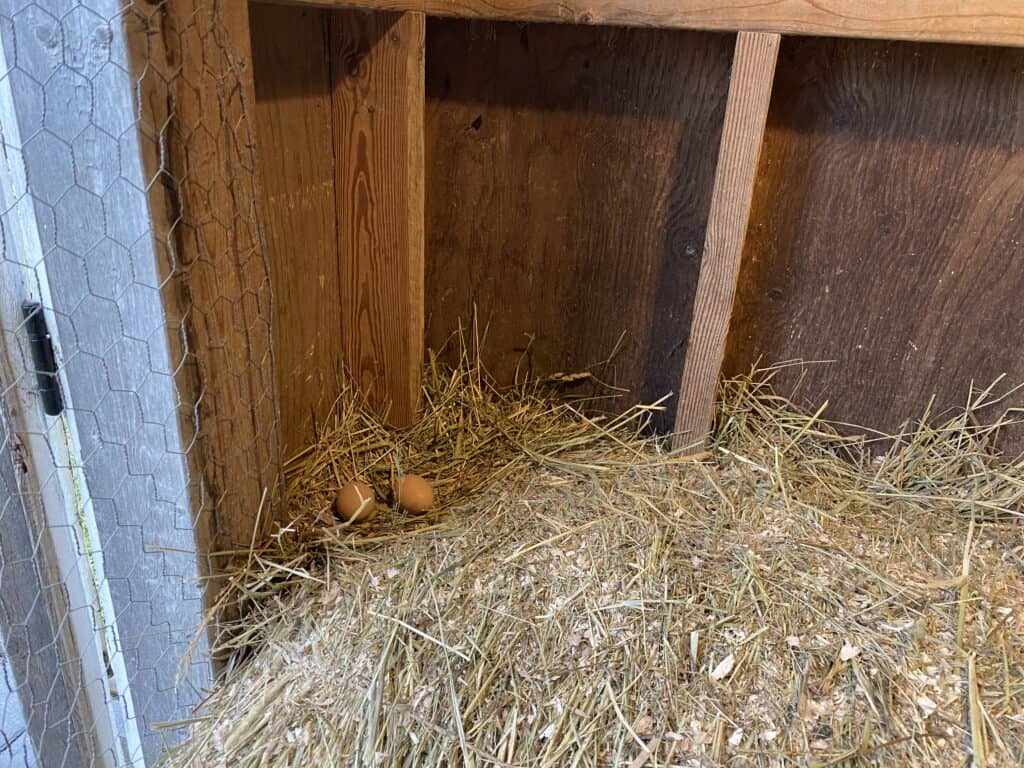
How To Keep Eggs From Freezing in the Winter
No matter how cold it is where you are, there are a few things you can do to keep your chicken’s eggs from freezing. Pick and choose the best tips for you for where you live and please be sure to put safety first and foremost when choosing.
Tip # 1. Insulate the Nesting Boxes
The very best way to keep farm fresh eggs from freezing is to create a space that is warm and sheltered from the outside elements. To do this most effectively you will need lots of straw or bedding.
I like to fill our chicken’s nesting boxes full of straw so my chickens can make a bed inside that is comfortable and more importantly toasty warm. Some of my hens will do such a good job that I will find six or more eggs in one nesting box and none in the others.
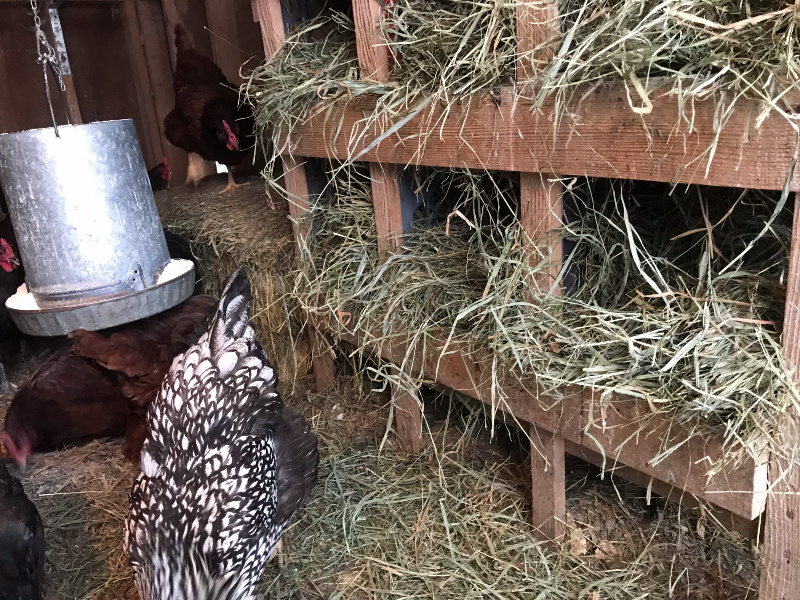
How does a straw in a nesting box keep a chicken’s eggs from freezing?
The straw helps to keep the egg from freezing by insulating it from the frigid air allowing the natural warmth of the egg to remain. This is just a temporary fix, however, and not one you cannot completely rely on in the deep cold temperatures of northern areas.
You will want to keep an eye on the straw and replenish it as needed. The more a box gets used, the more the straw will be kicked out or compressed down. To help you remember, make a note to bring more bedding with you at chore time a couple of times a week and fill it as needed.
Remember, you can not overstuff a nesting box. If there is too much straw, your chickens will kick the excess out onto the floor. This will, in turn, put a warm coating over the frigid floor giving extra insulation to your coop.
Either way, the straw you added is serving a purpose.
If you live in a snowy area, it can be tricky bringing all the supplies you need each time you do chores. To help make things easier, you may want to try a sled. I just purchased this utility sled from Amazon, and I love it! I am now able to bring everything I need with me on one trip and no longer have to walk back and forth for all of my feeding supplies.
By far the very best purchase I have made to date! You can find my favorite homesteading supplies here.
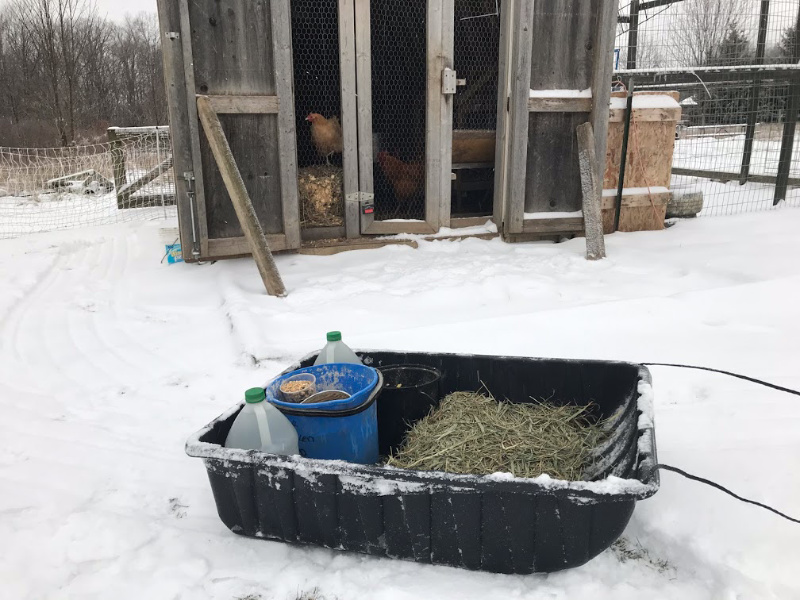
Tip # 2. Keep Your Chicken Coop Draft Free
This is an important step even if you do not live in a frigid winter zone and one I like to have on my project to-do list each fall. Drafts can be deadly, so be sure to find them all and do what you can to correct them.
SLCG Pro Tip: Set up a fall coop checklist of everything you need to finish before winter hits. By doing a yearly coop inspection. you will catch any issues before they become a major problem.
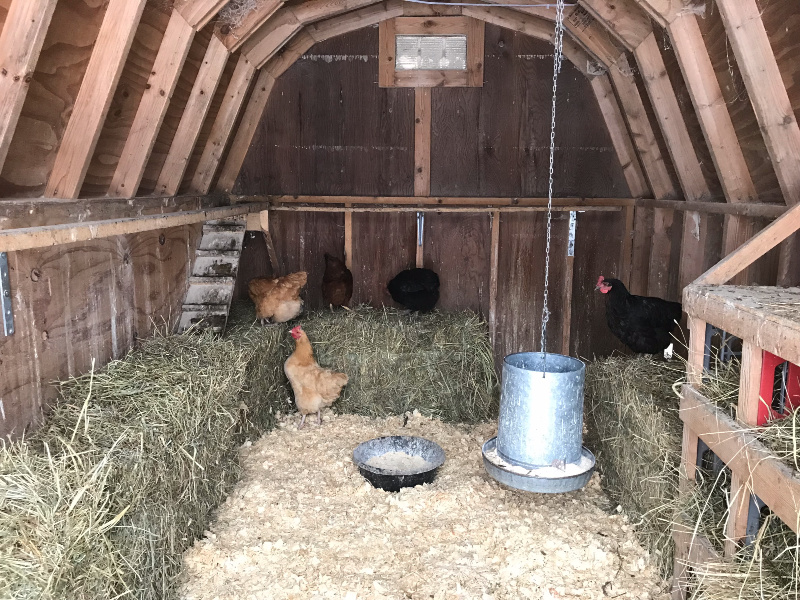
Inspect the walls, ceiling, and floors. Replace rotted boards and plug up any holes that you find. This will not only keep your flock healthier, but it will also keep predators out.
SLCG Pro Tip: You can also put tarps on your chicken run to help stop the heavy winds and drifting snow. This added protection will make it easier for your chickens to get into the fresh air. Coops can be dirty and dusty even in the winter so proper airflow is key. If you do add a tarp, I suggest hanging it on the side that takes the brunt of the winds.
READ: HOW TO PREPARE YOUR CHICKEN COOP FOR WINTER
Tip #3. Keep Your Nesting Boxes on the Warmest Wall
Most of us know already which direction the winds blow in our particular area. Set up your chicken coop so the door is away from the wind and the nesting boxes are on the warmest wall away from the wind as well. By placing your nesting boxes on a wall that will get the least of the winds and as far from the coop door as you can you will give your chickens a bit of warmth as well as their fragile eggs.
You can also put your nesting boxes on the east side to take advantage of the sun in the morning. Even in the frigid winter, the sun is surprisingly warm. Use mother nature to help you heat things up a bit more.
If you have a small coop, then you may not have room to keep your boxes far from the door, if that is the case then at the very least choose the wall furthest from the cold winds. Even these small tips can make a big difference in the warmth of your chicken coop.
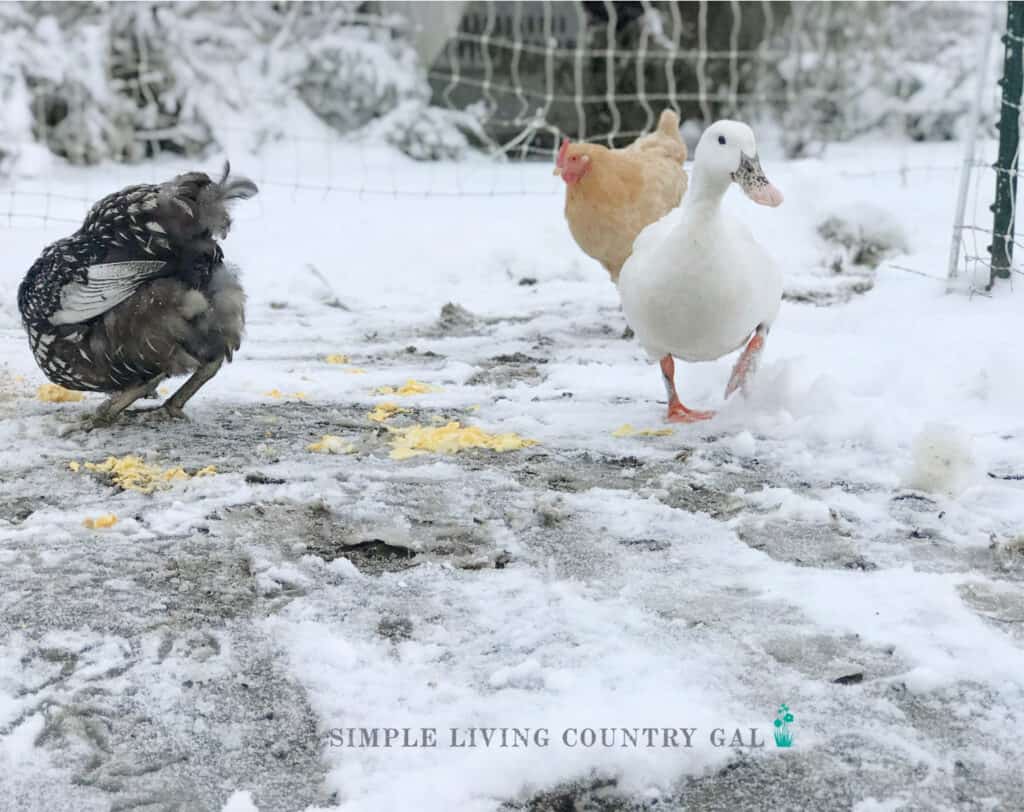
Tip #4. Add Curtains to Windows
If you have windows in your coop, then consider adding curtains to keep the drafts out. You might be amazed at how much this helps with the cold. Windows can be very drafty and even though we do want ventilation we do not want drafts. Consider hanging a few thick curtains over your windows and keep the gals warmer along with their eggs.
You can make curtains with any leftover material. Reuse what you have such as a sweatshirt, old bath towels, or even blue jeans. Cut out a square of fabric that is several inches larger than the window and nail it into place.
If you find you have a heavy draft coming in through the outside of your windows you may need to do some repair work to help seal things up a bit more.
You can also add curtains to the nesting boxes as well. Don’t worry that your chickens will stop using a box after you put a curtain on, they will quickly learn they are still able to get inside and will even prefer boxes with curtains on the front.
Tip # 5. Collect Eggs More Often
One of the easiest ways to keep eggs from freezing is to collect them before they do. If you have had your chickens for long, then you probably have a pretty good idea of when they lay their eggs. My hens tend to lay either very late morning or early afternoon.
In the winter I like to go out at 11 am and then again at 3 pm to collect eggs. The second collection is important especially on very cold days. Eggs can freeze quickly and by adding a second collection time you can lessen the frequency of frozen and cracked eggs.
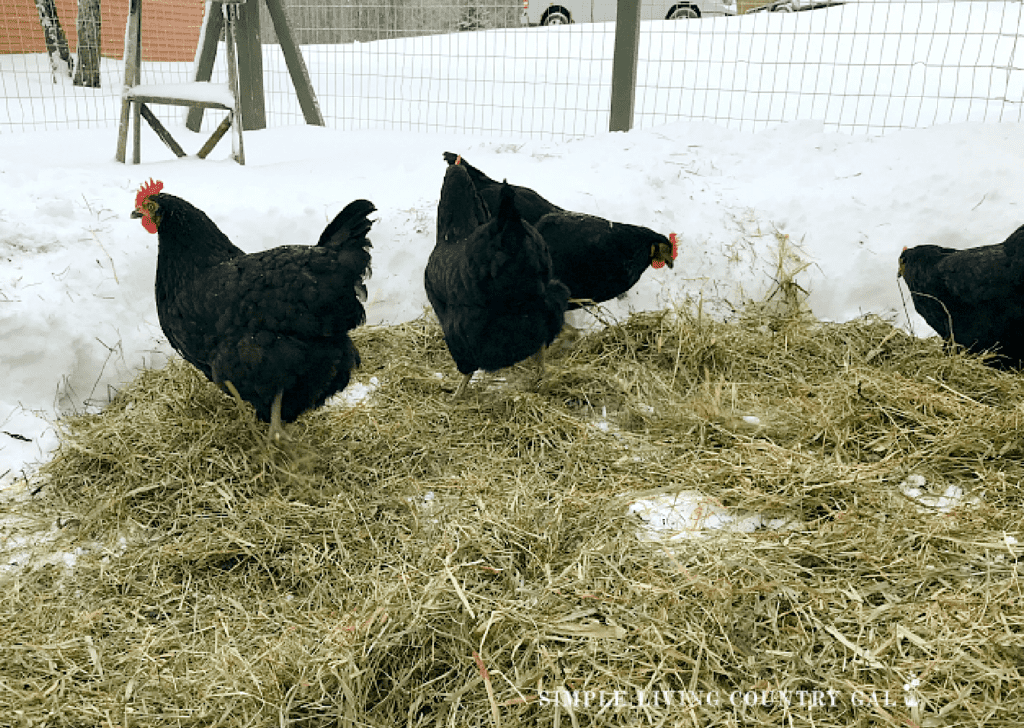
If you are new to chickens you can discover your flock’s laying schedule just by visiting the chicken coop every few hours each day for about a week. This will give you a pretty good idea of when your hens lay so you can collect farm-fresh eggs a bit more efficiently.
Tip # 5. Bring in Some Heat
Before we dive into heat lamps, let me first say that these things are dangerous and you must do this at your own risk.
I prefer to avoid heat lamps in our coops altogether even when the temperatures plummet to below zero. For us, the risk of fire is too risky to mess with. I prefer instead to acclimatize our flock to the cold naturally and trust that their bodies can adapt and adjust as the temperatures get colder.
We have used heat lamps before and one close call almost burnt down our barn. Because of this, we no longer use them in our chicken coop. Just know if you follow the tips in the article you will be able to keep eggs from freezing even without dangerous electric heat lamps.
Disclaimer: Heat lamps are dangerous and one of the biggest causes of fires in barns and coops so please proceed with caution here. Just last week there was a fire in a chicken coop that destroyed the coop and the attached garage. So, please proceed with caution.
On our homestead, we prefer to use the deep litter method, and we find the natural insulation it provides does well enough to keep our gals warm.
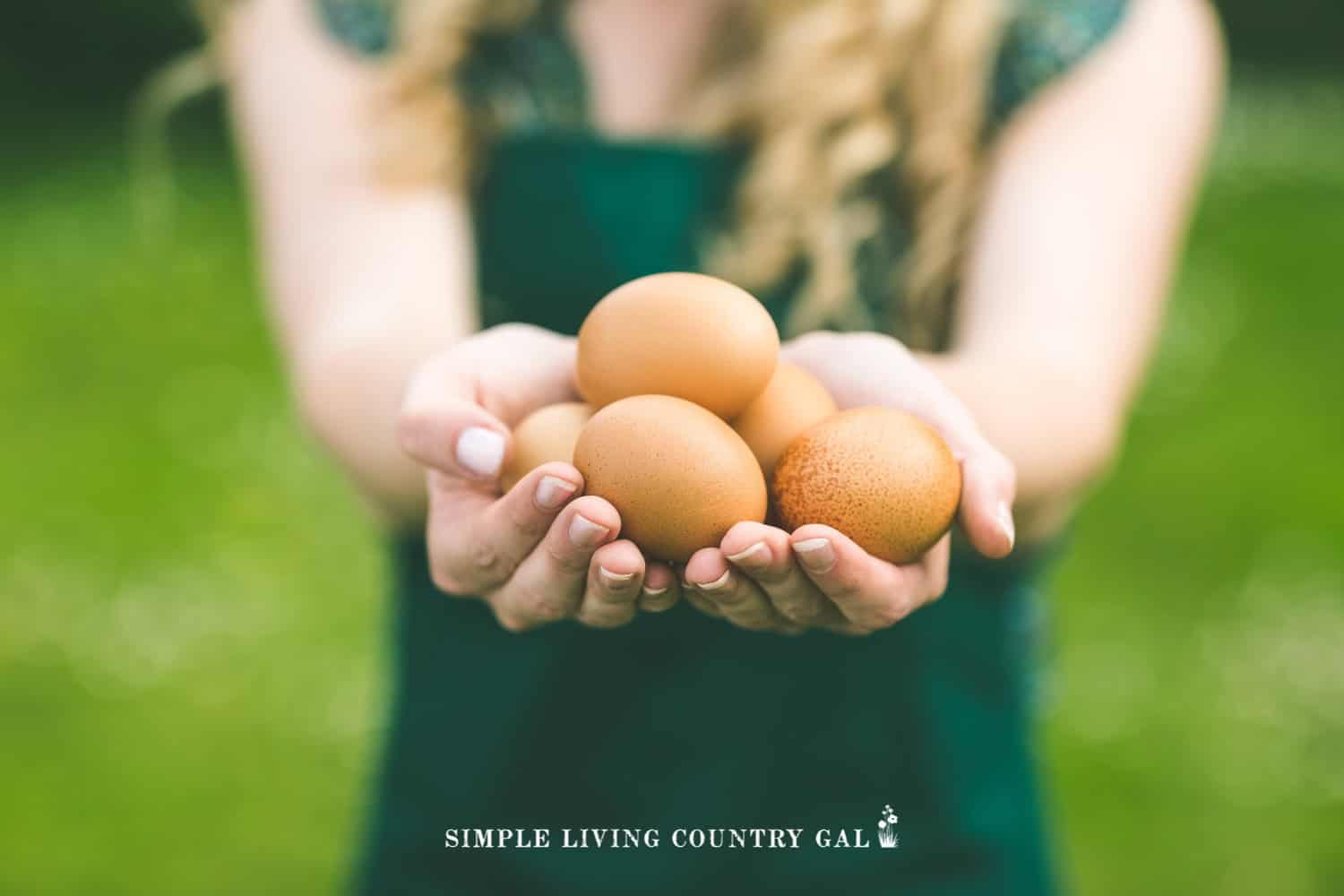
READ: HOW TO USE THE DEEP LITTER METHOD IN THE CHICKEN COOP
If, however, you want to bring in a bit more heat, you do have a few options.
Heat lamps
A heat lamp is a light and bulb that is specifically made to produce heat. You will need an electric source in your coop for this. Please know that an extension cord is absolutely not a safe option.
If you do have electricity inside of your chicken coop and choose to use a heat lamp, be sure to use every safety measure you can. Double-secure the light with chains and zip ties to keep the hot lamp securely in place. Also, put lights far away from chicken roosts and nesting boxes, so the chickens do not fly and accidentally knock the heat lamp to the ground.
Heat lamps get hot, very hot, and since the coop is filled with dry, brittle straw or hay, one touch can quickly mean disaster. I am not saying this to scare you; I just want you to be fully and completely aware of the risks involved, be sure to take every precaution if you choose to use lamps to heat your coop.
Chicken Coop Heater
A portable coop heater is a newer option that seems to be a bit safer however, I have never seen one in person or used one myself. Again, you will need electricity in your coop to use this since an extension cord is not safely recommended.
Depending on the size of your coop, you may need two of these, but from what I have heard and read they seem to work surprisingly well.
Heated Chicken Mat
You can also try a heated chicken mat, but since it is a floor mat, I am not sure how much it will help to keep eggs from freezing. Your chicken’s feet will be cozy but not necessarily the eggs.
Again, this is not something I have tried, so you will want to do a bit of research before purchasing.
So, now that we have covered a few ways to keep eggs from freezing, what can we do if our eggs are already frozen?
In the winter, chicken eggs can freeze in just 3 hours, so it is only natural that we will all encounter a few frozen eggs in our chicken-raising lifetime.
There are a few options you can do if your farm fresh eggs are frozen and no, tossing them is not one of them.
Disclaimer: If you find a frozen egg that is cracked, I would not eat this egg. Chicken eggs can be dirty even if they do not look it. For that reason, my option for cracked and frozen eggs is always to feed to our flock, and other animals, or toss them all together.
What to do with frozen chicken eggs
Before you dive into any of these options, you will first need to thaw your eggs. If they have cracks, do NOT use these eggs for human consumption. There are a few things to know about the safety of eating farm fresh eggs, and I encourage you to educate yourself fully.
When it comes to frozen eggs, you will first want to remove any dirt or debris from them and inspect for any cracks. To thaw, put uncracked eggs in a bowl and place them inside the refrigerator, allowing them to thaw slowly. If you see any of the eggs actually do have cracks, remove them and thaw them separately in a bowl the same way.
Before using eggs for you or your family, check them thoroughly once again for any cracks. If you find cracks, then open them into a jar to save for use for your animals.
#1 Feed Them (Cooked) Back to the flock
Eggs are an amazing source of protein and great for chickens. I like to feed a few eggs back to my flock each week as a warm treat, especially on those cold winter mornings. The key here is to cook the eggs before you feed them, so you do not run the risk of your chickens developing a taste for raw eggs.
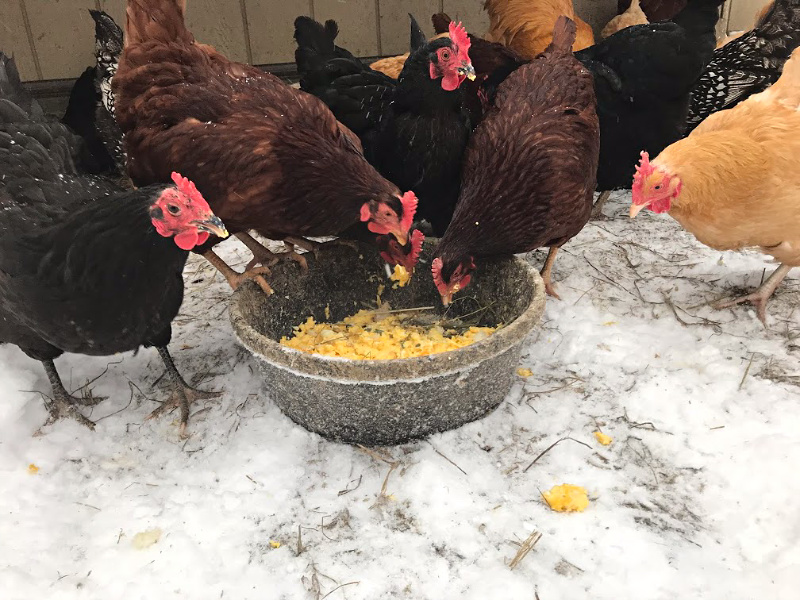
SLCG Pro Tip: You can add herbs to your eggs to create a healthy treat for your hens as well. I love this recipe for chicken egg casserole from Timber Creek Farm, and my hens do too!
#2 Feed Them to Other Livestock
If you have pigs, they love to eat eggs. Scramble up a few eggs and toss them in their bowl, and they will come running. The same is true with any cats you have.
Warm eggs on a cold morning is a treat both people and animals enjoy.
#3 Thaw and Eat
If an egg is not cracked, then you can simply thaw it and eat it yourself.
To thaw, clean the egg and place it in your refrigerator to bring the frozen temp down slowly. Once it is thawed, the best way to eat the egg is to hard boil it. I am told you can scramble it as well, but I have not tried it to see how their taste or consistency is altered.
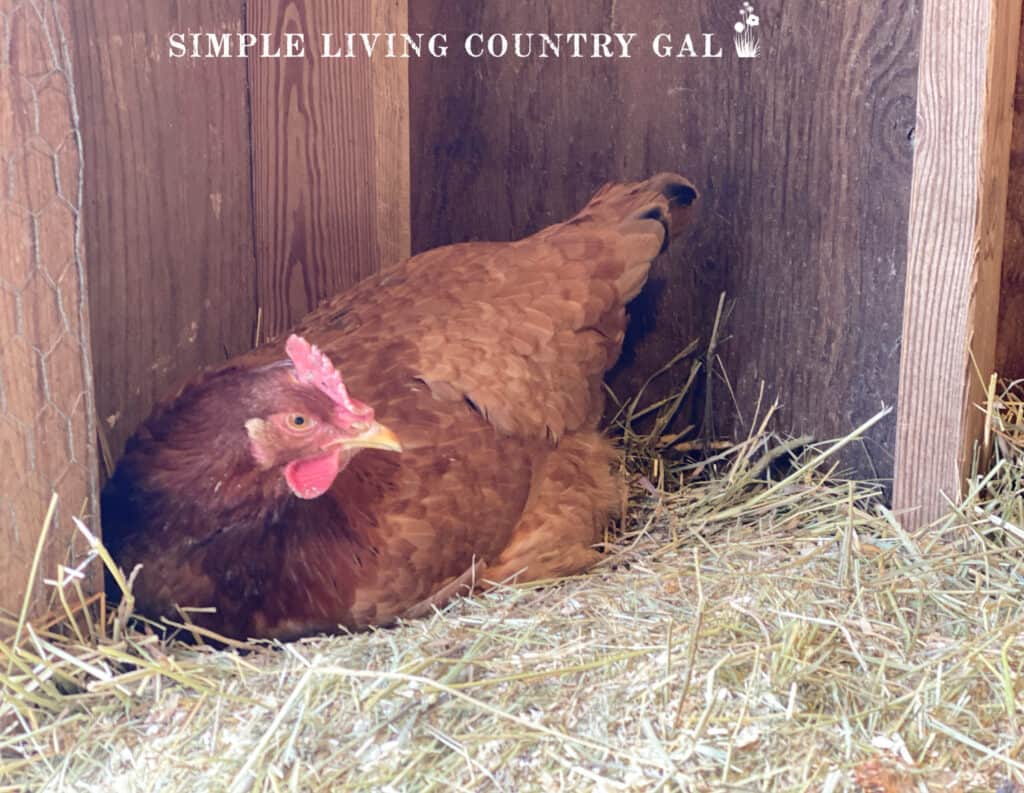
If you live in a very cold climate, prevention is always the best way to go with our animals. When we help ensure our animals are warm in the winter, our eggs will stay unfrozen as well.
A solid draft-free chicken coop, placing nesting boxes on a warm wall, adding extra insulation such as straw bales, and frequent egg collecting should all be enough to keep eggs from freezing in the winter.

I get asked this all the time too and these are some really great, real world tips! Thanks for sharing with us at the Homestead Blog Hop, please come back again soon!